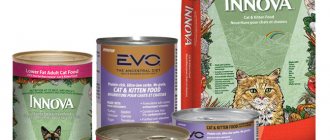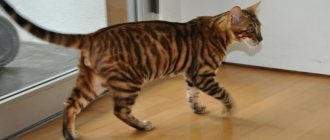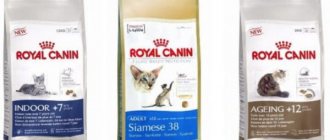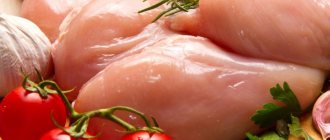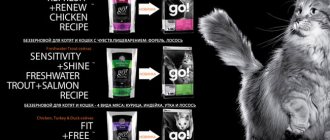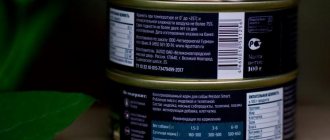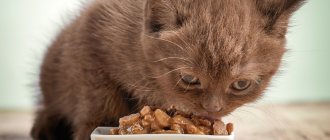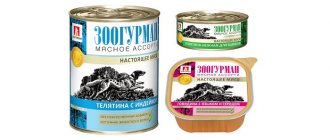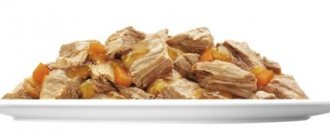BRITISH KITTENS, CATS, CATS CARE, FEEDING, NUTRITION: RULES FOR BRITISH
British cats, whether cats, cats or kittens, need daily care and feeding (nutrition). This needs to be done correctly, because this is not a newly acquired toy, but a small living creature. You need to take the care and feeding of British cats seriously. It must be remembered that this is a purebred animal, and one might say “artificially created” by man. The immunity of all purebred animals without exception is very weak. And the fact that a barn cat is considered normal is not suitable on the menu of a British kitten.
Basic feeding rules
First of all, it’s worth understanding the basic rules of catering:
- The most common mistake made by owners is mixing natural and dry food. There is a misconception that adding meat, fish or vegetables to your cat's favorite bag will have a beneficial effect. In reality, this approach can be fraught with problems with the gastrointestinal tract and urinary system.
- Some owners follow the above rule, but sometimes allow exceptions. For example, when choosing mostly natural food, sometimes they treat their pets to purchased food as a reward for something. Such feeding is also extremely undesirable, because different types of food are digested differently.
- The cat should not remain hungry for more than 2-3 days. This is extremely important to consider when planning to be away from home for a long time.
- Cats and dogs should have different diets. The fact is that the latter synthesize some amino acids independently. But the heroes of this article cannot do this, so the owner of both animals must take into account. Therefore, you will have to abandon the same nutrition plan.
- If the cat is fed natural food, you should think about an additional dose of vitamins. Dry food is balanced in advance, but fans of natural food will have to balance it themselves.
- Whatever type of food is chosen, it must be served warm. Of course, the meal should be stored in the refrigerator, but it should be reheated before serving to your pet.
- Cat rations should not be given “while the pet is eating,” but based on the following proportions: kittens - 10% of their weight, adults - 5%.
WHEN SHOULD I START COMPLETE FEEDING FOR BRITISH KITTENS?
When to start complementary feeding for British kittens is a question that worries happy owners after joining the cat family. At first, this is the concern of the cat's mother. And the longer she plays this role of nurse, the better.
Complementary feeding should begin at about 3 weeks of age, preferably with milk for kittens. If suddenly the kitten refuses to eat, then you should wait a little and offer it again for a couple of days; most likely the kitten is getting enough of its mother’s milk.
Character and disposition
The popularity of the British Shorthair has increased today due to not only its pleasant appearance, but also its extraordinary character. Their main distinguishing feature from other breeds is their sense of self-esteem.
The common belief that British cats are evil is wrong. These furry animals are just proud and unapproachable.
Special features in the character of short-haired cats are:
- Independence. British cats are an excellent variation for busy people. They calmly endure loneliness and do not require the constant presence of the owner. Although they are always happy to see him, they still prefer to spend most of their time in solitude, especially for adults. A British boy's attitude towards family members is the same, while a girl gets used to several people who show her care and attention.
- Cleanliness. Unlike other breeds, British Shorthairs love cleanliness. Proper care of cats of this breed is the main condition for their maintenance. Trays must be removed, and the room must be clean. The pet goes to the toilet in the right place, which it easily learns from an early age.
- Amenability. The British are tolerant of other pets. In the case of a friendly relationship, they will express love by licking their friend. There should be no competition between them, so each of them should have their own bowl of food, otherwise the British will remain hungry. A cat will never harm a child under any circumstances. To avoid provocations, the pet will try to hide from the eyes of the little prankster for a while.
- Mistrust. A cat that is affectionate towards its owner will never show the same trust to a stranger. He can study it in detail for a long time and sniff it. Earning the grace and favor of your furry friend requires a lot of patience.
- Touchiness and stubbornness. For a British person, being forced to perform any action is equivalent to violence. A person’s intentions to remake a cat or dictate his terms to it will end in complete failure. The pet will immediately hide in a secluded place, ignore the owner, and maybe even bite. The lop-eared and marbled Briton is particularly touchy.
- Impressionability. Despite their confident habits and calm disposition, these four-legged furry pets are distinguished by strong emotionality. They experience anxiety, nervousness, and tension during moving, short trips, loud parties and quarrels in the family. A restless atmosphere and screams frighten the cats, as a result of which they begin to lick themselves vigorously.
FEEDING BRITISH: BRITISH KITTENS, CATS, FROM BIRTH TO ONE YEAR
Feeding of the British: British kittens, cats, cats from birth to one year we will divide them in detail and describe them in the table.
Until the age of 3 months, a British kitten receives nutritious food in the nursery, and then the new parents monitor its nutritious nutrition.
| Feeding Brits by age | How many times to feed a Briton: British kitten, cat, cat | Diet of a British kitten, cat, cat: British food at a certain age | What do British kittens eat: balance of dry and wet food |
| British kitten 0-3 weeks | What to feed small British kittens? — We don’t feed, the mother cat takes on this important function. | ||
| British kittens, feeding at 3-4 weeks | We start feeding once a day; by the end of the 4th week, complementary feeding should be 3 times a day. The main food is still the milk of the mother cat. | British kitten diet:
| 100% wet food |
| Feeding British kittens at 1-1.5 months | Complementary feeding 3-6 times a day (depending on the frequency of feeding the mother cat). Kittens gradually refuse their mother's milk. | What to feed a one-month-old British kitten - Diet of a British kitten:
| 100% wet food |
| Feeding British kittens at 2 months | What to feed a British kitten - Complementary feeding 6-8 times a day in small portions | British kitten diet:
| 100% wet food, some of which is soaked dry food (so that kittens get used to the taste of such food) |
| Feeding British kittens at 3 months | Complementary feeding 6 times a day | British kitten food:
| 90% wet food, 10% dry food |
| Feeding British kittens at 4-6 months | Complementary feeding 5-6 times a day; by the end of the 6th month, feeding a British kitten is reduced to 4 times a day | British cat diet:
| 70-80% wet food, 20-30% dry food |
| Feeding British kittens at 6-10 months | British kittens are fed 3-4 times a day | Diet of British cats:
From 6 months we remove milk from the diet! | 60-70% wet food, 30-40% dry food |
| Feeding a British cat 10-12 months | The British cat is fed 2-3 times a day. Feeding British cats after 10 months can already be practically equated to adult nutrition. | Diet of British cats:
| 50-60% wet food 40-50% dry food |
| Adult British cat, feeding after a year | Feeding remains this way throughout the animal’s life. Feeding a British cat after a year - 2 times a day. | Diet of British cats:
| At least 30% wet food, the rest dry food |
Diet and feeding regime of the British
Adult cats of the British breed are fed no more than once a day in the summer heat, and twice a day in all other seasons.
It is very important that the cat is fed according to a schedule. Balanced cat food per kilogram of weight may consist of the following ingredients:
- beef meat – 20 Gy;
- soft cheeses – 10 G;
- cereal – 4 Gy;
- sunflower oil – 0.2 G.
By adhering to proper nutrition, the cat will live a long time without illness, without visiting a veterinarian, delighting its owners with a grateful purr.
HOW TO FEED CORRECTLY A BRITISH: BRITISH KITTEN, CAT, CAT
How to feed a British cat correctly: British kitten, cat, cat? First of all, you need to remember that Britons, like other cats, are predators. There is no need to insist that your pet eat cereals, cereals, vegetables, eggs, etc. The main diet of British cats is meat: beef, chicken, turkey, rabbit, fish, liver, heart, etc. Properly feeding a British cat means maintaining a balanced diet, periods between feedings, not overfeeding and monitoring the animal’s weight. Also read about everything a kitten needs in a new home.
Caring for a kitten in the early stages
For your pet’s comfort, you should take care of his sleeping place in advance, equip a corner for feeding and toileting, and buy toys.
How to care for a British kitten so that adaptation to a new home is painless:
- arrange the area in the apartment so that the pet feels safe;
- give time to get comfortable in an unusual environment, even if he hid;
- do not shout, do not raise your voice, so as not to frighten;
- limit access to narrow crevices behind furniture, from where it will be difficult for the kitten to get out on its own.
Bedding for British kittens.
A place to sleep - also known as a sleeping house
When a Briton gets into a new home for the first time, he will try to hide somewhere and choose a secluded corner in the apartment. It is better to place a bed or soft house next to this place so that the kitten quickly gets used to being there and feels safe.
It is not recommended to suddenly change your sleeping place. It is necessary to move the bed gradually, by 5-10 cm daily.
Bowls
The feeding area is equipped with bowls for food and drink made of plastic, metal or ceramics. Metal and ceramic bowls last longer, do not scratch and are less dirty.
Plastic ones cost less, but quickly fade and wear out. To prevent containers from slipping and food from spilling, special mats are used.
British kittens are naturally clean and may refuse food if it is weathered. It is recommended to clean up any leftovers after feeding and change the water regularly.
Toys, scratching posts or houses
Little Britons are playful and enjoy communicating with their owners. Suitable toys:
- rustling candy wrappers on a thread;
- rubber mice;
- balls with bells inside;
- soft feather toys that are easy to grasp with your paws;
- spring rattles.
It is important to monitor the condition of the toys so that the kitten does not swallow the broken part. Racks covered with twine or soft houses will help prevent damage to furniture. You can buy them at a pet store or make them yourself.
Toilet
A traditional litter box with low sides is suitable for a kitten, as it will be easier to jump into. Over time, you can change it to another option:
- with a mesh replacing the filler;
- with high sides that prevent sand or sawdust from spilling;
- a closed toilet in the form of a house in which the pet will feel protected;
- automatic with self-cleaning system.
It is better to equip the toilet in a quiet place in the apartment so that the kitten gets used to it faster and does not get used to using other places for natural elimination, for example, the space behind the sofa.
HOW AND WHAT TO FEED A BRITISH KITTEN, CAT, CAT (BRITISH SHORTHAIR)
See the table for how and what to feed your British kitten, cat, cat. In addition to dry food, there are many useful and necessary products that your pet needs.
| Nutrition | Comments | How often can you feed your kitten this food? |
| Dry food | Premium/super premium class: Orijen, Acana, Farmina, Go, Eukanuba, Bosch, Innova Evo, 1st Choice, Hill`s, Optimal, Balmax, Animonda, Iams Cat, Royal Canin (not Russian!), Hill`s, Pro Plan ) Be sure to buy food according to the age of the kitten! | every day |
| Beef raw | Finely chopped or twisted through a meat grinder (be sure to freeze for at least 24 hours, you can first pour boiling water over it) | every day |
| Meat raw or cooked | Turkey, lamb, rabbit (any meat must be frozen for at least 24 hours) | 3-4 times a week |
| Canned food | Especially for kittens, preferably from the same manufacturer as the food | every day |
| Preserves | Especially for kittens, preferably from the same manufacturer as the food | every day |
| Children's canned meat | Orshansky, Agusha, Babushkino Lukoshko, Bellakt, etc. | every day |
| Boiled chicken | Can be done with broth | 2-3 times a week |
| Yolk | Raw/cooked, can be mixed with kefir, cottage cheese, sour cream, etc. | 2-3 times a week |
| Fermented milk products | Sour cream, kefir, cottage cheese, natural yogurt, cream, yogurt, fermented baked milk (all without additives) | 2-3 times a week |
| Vegetables | Zucchini, pumpkin, carrots, cabbage | 1-2 times a week |
| Cereals | Rice, oatmeal, buckwheat | 1-2 times a week |
| By-products | Liver, heart, chicken gizzards, kidneys, tongue, tripe (beef and chicken) | 1 time per week |
| Omelette | Egg with milk, without salt, seasonings, etc. | 1 time per week |
| Cheese | Not greasy | no more than once a week |
| Boiled sea fish | Only fillet, cook for 5-10 minutes, optional with broth | no more than once a week |
| Fresh water | Change the water at least once a day | always freely available |
| Grass | You can buy already sprouted or grow it yourself; the grass can also be replaced with a special paste for digestion, sold at any pet store | every day |
| Vitamins | Beaphar vitamins are excellent today. Required according to age and weight! | according to instructions |
Wet food
Wet food and canned food are most needed in the early stages of a kitten's life. Up to three months of life, food should consist of more than 90% of them. By the age of one year, the kitten can already be fed half dry and half wet food. Veterinarians recommend that canned food take up at least 20% of an animal’s diet throughout its life.
Choosing the right wet food is very important. Cheap economy class options can cause significant harm to an animal's sensitive digestive system. In addition, they are not able to give the kitten all the vitamins necessary for development.
What food is best to feed a British kitten:
- Bozita Mini Kitten Chicken - Chunks in Jelly, premium food - these are pieces of natural chicken fillet in jelly, which are great for feeding little Britons.
- Hill's Science Plan Healthy Development is a food containing ocean fish and chicken. Also contains corn flour, taurine and starch.
- The well-known Royal Canin British Shorthair Adult is suitable for kittens from one year old. It also supports the health of the digestive and circulatory systems.
- The special Royal Canin BabyCat Instinctive mousse is also worthy of attention. It helps the kitten smoothly transition from mother's milk to complete solid food.
When buying Royal Canin brand food, it is best to pay attention to imported supplies.
NUTRITION FOR BRITISH KITTENS, CATS, CATS: PROHIBITED PRODUCTS FOR BRITISH people
Prohibited foods for feeding British cats (British kittens, cats, cats) should be remembered and avoid feeding the animal with them. This can lead to serious consequences!
CAN BRITISH FISH?
Can Brits eat fish? – You can, but only boiled seafood and definitely fillet.
River fish themselves live in a not very clean environment, and for a purebred British kitten this can be critical. Be sure to boil the fish, because... we don’t know where it was lying, what hands touched it and what else it might contain. After keeping it in boiling water for 10 minutes, you can safely give it to the kitten. Be sure to remove any bones; fish bones are quite sharp and can injure your pet.
CAN A BRITISH KITTEN HAVE MILK?
Can a British kitten have milk? – It’s also possible, but only up to six months. It is not recommended to continue giving milk, as it is poorly digested in cats. It is better for the British to replace milk with fermented milk products.
What not to feed a British kitten:
|
Natural nutrition
Creating a suitable diet yourself is a labor-intensive process.
Many veterinarians do not recommend feeding a purebred animal this way. But if you still don’t want to use ready-made diets, you should take into account the features of natural nutrition for the British. The basis of nutrition should include meat. This is the main ingredient. Chicken and lean turkey are best. The meat should be boiled, boned and finely chopped. You can add cereals to it in a ratio of 2 to 1: buckwheat, rice, millet. Finely chopped vegetables are used to provide animals with vitamins.
You should be careful with dairy products in your diet. They are needed only when the kitten is small, up to six months. After this, the milk ceases to be absorbed by the body, causing harm to it. You also need to exclude smoked foods, flour, sweets, fatty foods, bread and sausages from the diet.
With natural nutrition, it is also important to supply the animal’s body with vitamins. A veterinarian can recommend suitable complexes.
FEEDING NEUTERED BRITISH CATS AND STERILIZED BRITISH CATS
Feeding castrated British cats and sterilized British cats is practically no different from ordinary ones. The most important rule is to monitor the weight of the British, since all spayed and neutered animals are prone to obesity.
If, indeed, a castrated British cat or a sterilized British cat begins to gain excess weight, you should switch to low-calorie food; now there are special series of food for such animals. Contains more vegetables and less fat. This way you can regulate your pet's weight. You should also think about vitamins. Professional advice on an individual basis can be obtained at a veterinary clinic.
Rules
It is forbidden to feed a cat one type of product. For example, only meat or only fish. The diet must be balanced and varied, otherwise it will lead to health problems. If your British Fold only eats meat, you will be limiting its intake of other nutrients. For example, in calcium, and this in turn affects the occurrence of problems with the musculoskeletal system.
Forget about overfeeding raw eggs. If animals eat this way, they may develop biotin deficiency.
It is worth considering individual intolerances, for example, pets that eat milk may get diarrhea. You can’t give porridge like Hercules. You can add potatoes in any form to the list of prohibitions. Tubular bones, smoked chicken.
© shutterstock
WHAT TO FEED A PREGNANT BRITISH CAT
What to feed a pregnant British cat: the diet remains the same. Add more beef, beef heart, liver. We do not overfeed the British cat - if you give too much excess food, and also high-calorie food, the kittens will grow too large and it will be difficult for her to give birth to them. Vitamins are also not recommended.
What is really important is the transition from regular dry food to food for pregnant women. Now almost every manufacturer has provided for this and has released special lines of food for pregnant cats, for example, Royal Canin QUEEN.
| In our cattery you can “buy a real British kitten.” We have many different colors, we will help you choose and answer all your questions! |
Premium cat food price
We have already said above that despite approximately the same quality of composition, many premium cat foods are very different in price. We make a comparison so you can clearly see how much.
- Advance 1.5 kg - from 621 rub.
- Eukanuba 2 kg - from 863 rubles (1.5 kg ≈ 647 rubles);
- Brit Premium 1.5 kg - from 429 rubles;
- Happy Cat 1.4 kg - from 835 rub.
- Pro Plan 1.5 kg - from 915 rubles;
- Organix 1.5 kg - from 462 rub.
- Royal Canin 2 kg - from 898 rubles (1.5 ≈ 674 rubles);
- Probalance 1.8 kg - from 350 rub.
- Science Plan (Hills) 1.5 kg - from 720 rubles;
- Wahre Liebe 1.5 kg - from RUB 1,177.
The above prices are current at the time of writing - October 2020. Over time, they can change significantly; the exact cost can be found on pet store websites, links to which are in our food reviews.
Rules of education
The character of British beauties begins to form at 3-4 months, and this process continues up to 1 year. During this period, it is important to pay special attention to raising your pet. But the taming process can be difficult if the following rules are not followed:
- Teach cleanliness. It is important that the kitten realizes that caring for its fur, ears, and claws is a necessary procedure.
- You should not be strict. However, the cat must understand the difference between itself and the owner.
- Get used to eating only from your own bowl. It is not recommended to give your cat food from the table.
- Don't hit or scream. The British will not understand such an attitude towards themselves, and will not tolerate it. As a result, he will stop making contact. It is advisable to show with your voice that bad behavior is unacceptable and you cannot do this.
- Praise your pet periodically. For example, for good behavior, treating him with a treat and showing his care and sympathy.
- Be systematic in your requirements. This rule must be followed by all family members. If the cat feels that the owner is not strict, he will do what he sees fit.
- Sterilize. The procedure must be carried out when kittens are 6-9 months old, after which they become calm.
The character of British cats is complex, and it is almost impossible to re-educate them. It is important to remember that the wrong attitude often leads not only to negative results, but also ends in severe resentment and stress for the animal.
People need to know that a pet’s good disposition is associated, first of all, with compliance with the rules of upbringing, and not just with the characteristics of the breed.
